I Have A Crackpot Theory For The Fnaf Movie.
I have a crackpot theory for the fnaf movie.
Despite knowing of Garrett's ghost, we haven't seen any real hint of it. Or so we've been led to believe.
Garrett's memory haunts Mike throughout the movie, so isn't it strange that such a prominent character doesn't appear as an animatronic unlike Every Other Kid William Has Killed?
I say he did.
Each of the murdered kids has something associated with the animatronic they come to haunt, such as Bonnie's kid having rabbit ears or Foxy's having a hook.
Now, Garrett. He has one very signature prop that he wields: a toy plane. Not just any plane though, but specifically a propeller plane.

So what? Well let me tell you. There is an animatronic in the movie that is not only associated with propellers, but also haunts Mike throughout the movie.

Conclusion: Garrett is Balloon Boy.
More Posts from Zodixyz and Others
good content
Sick list of symptoms bro. Now try humanizing your behavior instead of pathologizing it.
it's quite frustrating when you work up the courage to tell someone you have DID, but they hit you with "well, *i've* never noticed you switch" or "to me you're always the same person".
i think those statements are so misinformed to how DID (most often) presents. there are some things to note when observing DID from the outside:
not all cases of DID are overt. overt refers to your symptoms, switches & differences between alters being obvious to people from the outside. overt DID is less common than its counterpart *covert* (more secretive) DID. in covert DID, symptoms may be less noticeable from the outside, & that may lead to difficulty being diagnosed.
masking. masking is the ability some people possess to pretend to be someone/something that they are not. in DID, alters who are not the host part may mask as the host part to feel safe, undetectable, or simply out of instinct. before discovery of the system, this may be a subconscious effort; after discovery of the system, this may be purposeful in order to hide alter differences from others, for any reason.
complexity of identity. let us imagine that the host in a system is an ambivert - not quite introverted, & not quite extroverted. this host switches out, in front of their friend group, & a social part or other extroverted & friendly alter takes their place. their friends assume that they are just in a "friendlier mood", while in reality this person has switched. meanwhile this alter has a completely different set of interests, identity, & such, but since it is not brought up in conversation, the friend group does not suspect their friend has switched between separated self-states. identity is complex, & alters are (often, not always) able to feel & express a large range of emotions, depending in their mood. this can make it harder to tell the difference between an alter being in a strange mood, & a whole new part fronting!
so, next time you meet someone with DID, believe them. not all of our experiences are visible! edit: "DID" here can also be replaced with OSDD1, P-DID or UDD, but i just used DID because that's my specific experience.









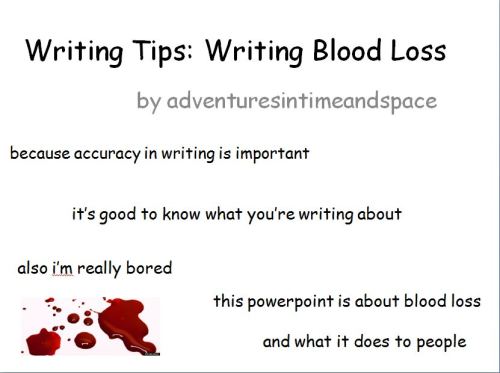
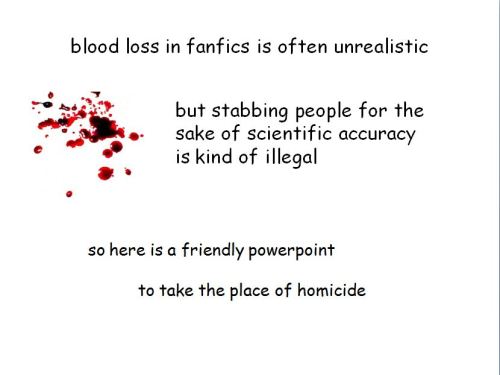

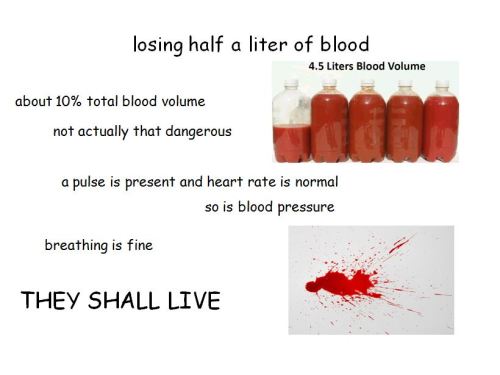
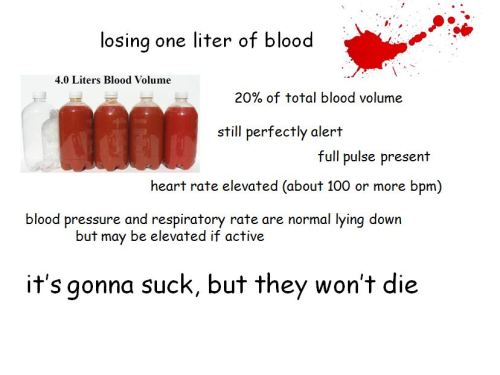
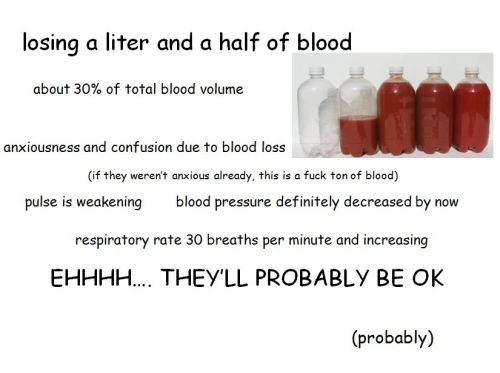



Here are some scientific facts about blood loss for all you psychopaths writers out there.
Having a dissociative disorder feels so weird BC you just kinda go from being super smart and self aware to atfdvbvdf brain melt gfcvhugfc only one brain cell left in seconds
No one really tells you that when you're disabled, visibly or not, you'll have to get over feeling the need to apologize for everything.
You'll apologize for
Not being able to move quickly through small doors and walkways
Not being able to eat foods your friends like, make, or want you to try.
Having to ask for help.
Asking for space and to not be touched.
Needing accommodations
Being passionate about something
Being tired
Being tired when you weren't an hour ago
Being in pain
Being in pain when you weren't an hour ago
Going outside
Not going outside
Being on disability
Having brain fog
Needing medication
Not being "nice"
Using mobility aides
Asking people to simply do their jobs
Wanting to be treated like a human
And so much more
I know I shouldn't apologize for these things. It's not my fault. But, when you've been raised in a world where your very presence is an inconvenience and worth apology, it's hard to not break out of that cycle.
Don't even get me started on the underlying feeling that your partner, family, and friends are saints for "putting up with you."
I know it's a thing I have to work though myself. It's internalized ableism that I need to fix. But it sucks that it was instilled in me and now I have to deal with it.
Here’s my metaphor for systemhood that I tell my singlet friends.
Imagine you’re playing a first person video game. You have the controller, you control your character. It’s a normal first person game. You are an alter, the character is the body. This is fronting.
Other people live with you. Sometimes, they come into the room and sit and watch while you play. They sometimes try to guide you, give you advice on what to do next. They don’t always agree, and they can argue with each other. Other times they scream at you that you’re doing everything wrong and you suck at this game. This is co-consciousness.
Imagine how distracting it would be for people around you to tell you what to do, or to scream at each other or at you, even if they have good intentions. It wouldn’t be easy to focus on your game, would it?
Then sometimes, something happens in the game that prompts you to hand off the controller to someone else so they can play and you get a break. This is (some types of) switching. This can be good.
Other times, someone rips the controller out of your hand or fights you for it. This is (other types of) switching. And sometimes, six other players hook up their controllers, but there’s only one character to play as. So all of you have your controllers, but you’re all trying to play the same character. This is cofronting.
Imagine how difficult that would be. Imagine how hard it would be to try and play a game while someone is trying to take the controller from you, or while six other people are trying to play too.
There are also times that nobody is playing, or you can’t decide who should play. What’s happening to the character in the game? What are they doing if no one is playing? This is dissociation. The character is doing nothing. They’re stuck.
This is the best metaphor I have come up with for being a system. It’s something a lot of people get because they’ve played games before.
Schrödinger's Disability

"Stop using your autism/adhd as an excuse!" I cannot tell you how often I got to hear that. Because here is the thing: Most people do not perceive either of those two diagnosises as "real". Even if they know they are real. Even medical professionals do not quite... understand it. Even those working with neurodivergent people.
Of course, if someone is the kinda autistic person who has also some sort of mental impairment, people perceive it as a disability - but if it does not come along with that kinda stuff, a lot of people treat it, as if we make an active choice to do or not to do something.
I told this story yesterday: When I was a kid, the following thing would always happen. When we would have art class, some of my pencils would drop from the table. Most likely because of dyspraxia. Now, when that happened I was simply not able to stop what I was doing. Because my brain cannot handle "stopping one thing to do another thing even for just a moment" very well. And it could handle it even worse when I was a kid. But also, I do not have object permanence. So, if an object does not exist within my field of vision, I just... forget about it. So, I often would just forget to pick the pencil back up. And teachers would be: "Oh, this boy is too lazy to pick up his own things." Which was not at all what was happening.
Another thing that happened to me too often is a very typical autism thing: Someone tells me something. But they do not tell me this in plain words, but rather imply it. So... I very much just not understood it. So, for example, I got told on a Discord Server by one user: "I have muted this channel." Which I understood as: "They muted this channel (maybe because it is very active)". What they said was, though: "I do not wanna see this channel, stop tagging me in this."
And mind you, this happens at work and university, too. A good example is the good old question of: "When are you done with this?" Which I usually understand as: "When are you done with this?" But what they mean to say is: "Hurry up, I need this now."
Last semester I had this happen at university even. Basically I misunderstood the final assignment, because it was not spelled out. Thankfully the professor was less of an asshole about it, than most people. I explained it to him, he understood, still got a good grade. But that tends to be more the exception than the rule.
As I said, this is a thing that even medical professionals do not really get. Even therapists do again and again fail to just communicate with autistic people clearly. They do not think about us usually being unable to understand implied meanings. We only understand the literal meaning for a lot of stuff.
And again: This is especially harsh with people like me, who superficially seem to function well in society. Heck, I have been told by professionals that I could not have ADHD or autism, because I archived a master's degree at university. Because they cannot comprehend that both ADHD and autism are a spectrum. It is not something you "either have, or have not" but it is a wide spectrum of symptoms that are differently strong in different people.
In Germany this also shows harshly when it comes to disability benefits. Because autism on its own rarely ever qualifies for disability benefits at all. Mental disabilities that might be linked to autism do. But autism on its own? No. Same goes with ADHD. And this... is kinda silly, right? Because we have studies upon studies that people with autism and ADHD often cannot work fulltime - at least not permanently. And we also know that generally neurodivergent people are more likely to be fired for a plenthora of reasons. So, yeah, we should kinda be treated like disabled, right?
And the worst part? In the parts where you get legally discriminated because of disabilities? Yeah, we still get that. We cannot immigrate into all other contries. Like, I cannot immigrate into New Zealand, for example, even though I would like too, because New Zealand discriminates against people with autism when it comes to immigration.
So... yeah. No, this sucks.
Nobody would tell a blind person overlooking a visual sign: "Stop using your blindness as an excuse". But with autistic people? It is the norm.
That DID vibe when you're filled with rage and anxiety and you feel like you're about to fucking snap and then suddenly your thoughts aren't coming through clearly and you feel like you can't move (even tho you CAN) and then.... Calm. Serenity. Indifference. Neutral. You no longer know what you were about to say, or why you felt so angry and anxious. Then you're like "Oh. I switched."
-
 grima4lurking liked this · 1 year ago
grima4lurking liked this · 1 year ago -
 solacewayne reblogged this · 1 year ago
solacewayne reblogged this · 1 year ago -
 solacewayne liked this · 1 year ago
solacewayne liked this · 1 year ago -
 pookiedarlingtwitch liked this · 1 year ago
pookiedarlingtwitch liked this · 1 year ago -
 gingerlywuzhere liked this · 1 year ago
gingerlywuzhere liked this · 1 year ago -
 zodixyz reblogged this · 1 year ago
zodixyz reblogged this · 1 year ago -
 zodixyz liked this · 1 year ago
zodixyz liked this · 1 year ago -
 slrpi liked this · 1 year ago
slrpi liked this · 1 year ago -
 send-me-a-puffalope liked this · 1 year ago
send-me-a-puffalope liked this · 1 year ago -
 nyctibius-grandis liked this · 1 year ago
nyctibius-grandis liked this · 1 year ago -
 junaslagoon liked this · 1 year ago
junaslagoon liked this · 1 year ago -
 g0dd3s0fw1sd0m liked this · 1 year ago
g0dd3s0fw1sd0m liked this · 1 year ago -
 yummygender liked this · 1 year ago
yummygender liked this · 1 year ago -
 fishingluremoon reblogged this · 1 year ago
fishingluremoon reblogged this · 1 year ago -
 fishingluremoon liked this · 1 year ago
fishingluremoon liked this · 1 year ago -
 renata-dp liked this · 1 year ago
renata-dp liked this · 1 year ago -
 haunted-plush liked this · 1 year ago
haunted-plush liked this · 1 year ago -
 wndelta reblogged this · 1 year ago
wndelta reblogged this · 1 year ago -
 wndelta liked this · 1 year ago
wndelta liked this · 1 year ago -
 horseshearsay liked this · 1 year ago
horseshearsay liked this · 1 year ago -
 slinksii liked this · 1 year ago
slinksii liked this · 1 year ago -
 brycen-ec liked this · 1 year ago
brycen-ec liked this · 1 year ago -
 i-successfully-bedazzled-my-face reblogged this · 1 year ago
i-successfully-bedazzled-my-face reblogged this · 1 year ago -
 uhhhohhahh liked this · 1 year ago
uhhhohhahh liked this · 1 year ago -
 spacebunsz liked this · 1 year ago
spacebunsz liked this · 1 year ago -
 forest-grotto-system reblogged this · 1 year ago
forest-grotto-system reblogged this · 1 year ago -
 forest-grotto-system liked this · 1 year ago
forest-grotto-system liked this · 1 year ago -
 thecoolergoj reblogged this · 1 year ago
thecoolergoj reblogged this · 1 year ago

Zero : They/Thema big ol' fruit with lots of love to give⭐️icon by @time-woods
163 posts